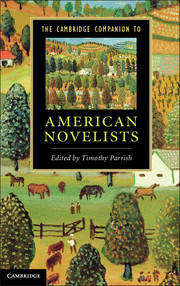Book contents
- Frontmatter
- Contents
- Contributors
- Introduction
- 1 James Fenimore Cooper
- 2 Nathaniel Hawthorne
- 3 Herman Melville
- 4 Harriet Beecher Stowe
- 5 Mark Twain
- 6 Henry James
- 7 Edith Wharton
- 8 Theodore Dreiser
- 9 Willa Cather
- 10 F. Scott Fitzgerald
- 11 Ernest Hemingway
- 12 William Faulkner
- 13 Henry Roth
- 14 Djuna Barnes
- 15 Zora Neale Hurston
- 16 Richard Wright
- 17 Raymond Chandler
- 18 Ralph Ellison
- 19 J. D. Salinger
- 20 Patricia Highsmith
- 21 Vladimir Nabokov
- 22 Jack Kerouac
- 23 Saul Bellow
- 24 Kurt Vonnegut
- 25 John Updike
- 26 Thomas Pynchon
- 27 Toni Morrison
- 28 Philip Roth
- 29 Don DeLillo
- 30 Cormac McCarthy
- Guide to Further Reading
- Index
- References
14 - Djuna Barnes
Published online by Cambridge University Press: 05 December 2012
- Frontmatter
- Contents
- Contributors
- Introduction
- 1 James Fenimore Cooper
- 2 Nathaniel Hawthorne
- 3 Herman Melville
- 4 Harriet Beecher Stowe
- 5 Mark Twain
- 6 Henry James
- 7 Edith Wharton
- 8 Theodore Dreiser
- 9 Willa Cather
- 10 F. Scott Fitzgerald
- 11 Ernest Hemingway
- 12 William Faulkner
- 13 Henry Roth
- 14 Djuna Barnes
- 15 Zora Neale Hurston
- 16 Richard Wright
- 17 Raymond Chandler
- 18 Ralph Ellison
- 19 J. D. Salinger
- 20 Patricia Highsmith
- 21 Vladimir Nabokov
- 22 Jack Kerouac
- 23 Saul Bellow
- 24 Kurt Vonnegut
- 25 John Updike
- 26 Thomas Pynchon
- 27 Toni Morrison
- 28 Philip Roth
- 29 Don DeLillo
- 30 Cormac McCarthy
- Guide to Further Reading
- Index
- References
Summary
“There is not a person in the literary world who has not heard of, read and some stolen from NIGHTWOOD. The paradox … is … I am the ‘most famous unknown of the century!’” Writing to Natalie Clifford Barney in the 1960s Djuna Barnes (1892–1982) makes a hyperbolic claim about both her 1936 novel Nightwood and her oxymoronic obscurity, but in neither case is she wholly misguided. Nightwood, described on publication as a book that “does not belong to any easily definable class,” is a defining work of the twentieth century but woefully absent on roll calls of the American novel. Barnes has been a marginal figure in the literary canon, a repeated anecdote of expatriate American modernism rather than a writer of influence. Barnes is difficult, what Daniela Caselli describes as an “improper modernist” not easily suiting labels such as “queer,” “feminist,” or “avant-garde,” and her fictional style can still disconcert the most diligent of readers. But Barnes’s major fiction shows that she is much more than a literary anecdote. Exploring Barnes’s career as a writer and novelist it becomes clear that she offers a particular response to the cultural and literary tumult of the early twentieth century and is a unique voice in the history of the American novel.
New York Journalism
Barnes began her writing career as a journalist in New York at the age of twenty-one, employed as a writer and illustrator for the Brookyln Daily Eagle in spring 1913. She was soon writing and interviewing for a range of New York publications including the New York World Magazine, New York Tribune, and New York Morning Telegraph Sunday Magazine. Established as a successful freelancer, Barnes went on to write for Vanity Fair after her move to Paris in 1919 and for the Theatre Guild Magazine in the early 1930s.
- Type
- Chapter
- Information
- The Cambridge Companion to American Novelists , pp. 135 - 145Publisher: Cambridge University PressPrint publication year: 2012



